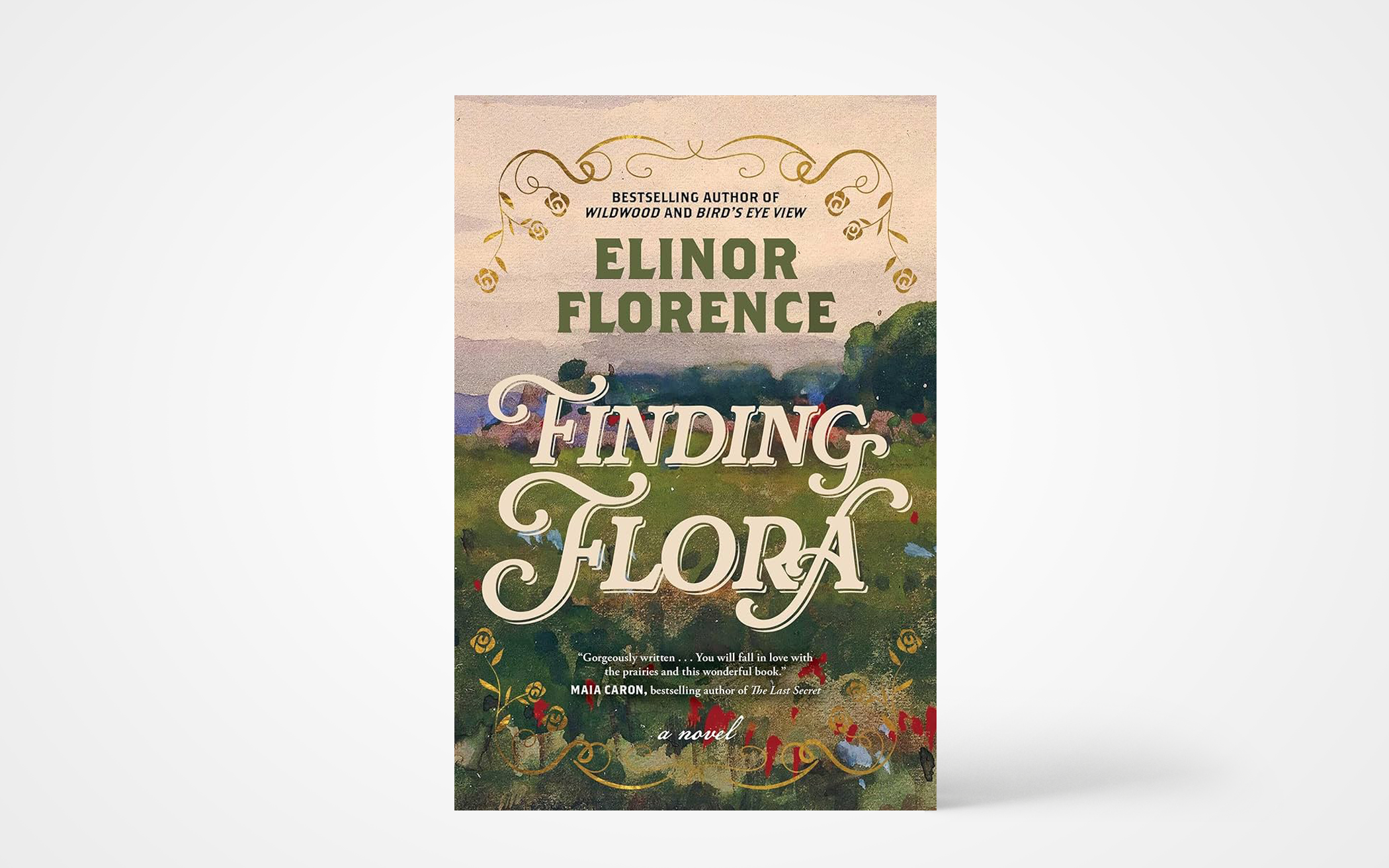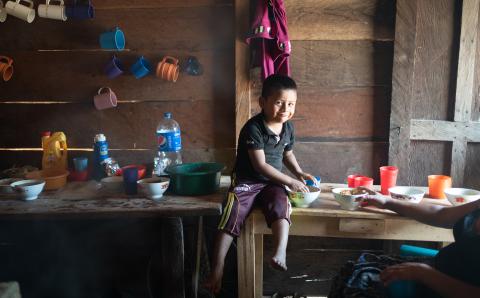Scattergood
By H. M. Bouwman
Reviewed by Sonya VanderVeen Feddema
It’s 1941, Iowa, and young teen Peggy grapples with the fact that the doctor has given her cousin Delia six months to live, so she sets out to try to fix what seems to be an unsolvable problem. At the same time she meets 16-year-old Gunther and a professor who are residing in Scattergood, a nearby Quaker hostel that has been reopened to host Jewish refugees from Europe. Peggy eventually learns the tragic stories about Gunther and the professor’s missing family members, who are presumed dead.
Richly metaphorical and movingly emotional, this coming-of-age novel grapples with questions about family and community relationships, atrocities committed in times of war, God, prayer, and life after death. Though recommended for children ages 10-12, Scattergood is better suited for ages 13 and older. Includes some instances of profanity. (Neal Porter Books)
Faith Takes the Train
By Kesi Augustine. Illustrated by Mokshini
Reviewed by Sonya VanderVeen Feddema
In New York City, young Faith and her mother return home on the train from Grandma’s house. Faith passes the time munching on a delicious sandwich, gooey with honey from Grandma’s beehive.
Suddenly Isaiah, her former neighbor, calls out, “Good evening! My son and I have fallen on hard times. Could anyone please spare some change? … A bite to eat?”
Before Faith and her mom leave the train station, she wonders if she will see Isaiah again and asks, “Can we bring an extra sandwich tomorrow?” Her mother agrees that it is a “delicious idea.”
Illustrator Mokshini’s buoyant, vivid rendering of life in New York City combines with Augustine’s tender narrative to show how kindness changes the giver and the recipient. (HarperCollins)
A Map to Paradise
By Susan Meissner
Reviewed by Sonya VanderVeen Feddema
Susan Meissner, a Christian who writes for the mainstream adult fiction market, adds another timely, compelling novel to her collection.
With a backdrop of the 1950s Red Scare and the Cold War, Meissner introduces us to Melanie, a blacklisted actress; Eva, a displaced person who immigrated to California from Europe; and June, a woman who takes care of her agoraphobic brother-in-law, Elwood.
In 1956, the three women become acquainted on Paradise Circle in Malibu, Calif., an idyllic setting in which paradise seems, to the unsuspecting eye, attainable. In A Map to Paradise, which includes profanity, Meissner deftly poses the question: Is there a map to paradise? And, if not, how can a person find home and belonging when obstacles abound and some secrets are too brutal to share? (Berkley)
The Blossoming Summer
By Anna Rose Johnson
Reviewed by Sonya VanderVeen Feddema
In this novel for children ages 8-12, author Anna Rose Johnson masterfully melds her First Nations heritage and Christian faith.
In 1940 London, England, 13-year-old Rosemary Rivers is happy to be reunited with her grandmother from Wisconsin. But Rosemary’s world is upended when Grandmother tells her the truth about her heritage. She isn’t British, as Dad has led her to believe, but Anishinaabe.
Why did Dad hide their heritage? And why does he become angry when Grandmother begins to teach Rosemary the language and traditions of her ancestors?
This tender coming-of-age novel highlights the contributions of First Nations, the injustices they encountered, and a path forward as imagined by a girl growing up in difficult times. (Holiday House)
The Hunger Winter
By Johanna M. Selles
Reviewed by Sonya VanderVeen Feddema
In the fall of 1944, 22-year-old Ada, her 18-year-old sister Lina, and their father struggle to survive in Holland under the occupation of the Nazis.
Father is a historian who has been working in his home office behind closed doors. Since his wife died, Ada has been in charge of running the household.
When the sisters discover the truth about what Father was working on, they realize the danger they are in and their responsibility to keep Father’s project out of the occupiers’ hands.
Filled with suspense, heartbreaking moments of loss and terror, piercing scenes of love and sacrifice, and spiritual reflections about God and his presence during wartime, The Hunger Winter is a sobering, yet hopeful read as it reveals that “even the worst darkness had not overpowered the light.” (Resource Publications)
What the River Keeps
By Cheryl Grey Bostrom
Reviewed by Sonya VanderVeen Feddema
Cheryl Grey Bostrom presents a stunning window into the history, Indigenous culture, and natural world of the Pacific Northwest. She tells a heart-wrenching story of the consequences of generational lies and strongholds and the transformative power of the Creator, who is always—always!—making things new.
Biologist Hildy Nybo and carpenter Luke Rimmer meet against the backdrop of preparations by the Lower Elwha Klallam tribe, scientists, and engineers to rewild the Elwha River by destroying two century-old dams.
What the River Keeps is permeated by the promise that Jesus will return and make all things new. Grey Bostrom is a master storyteller—look for some surprising plot twists!—and a sensitive observer of history, human relationships, spiritual realities, and the natural world. (Tyndale)
Safe Church
By Andrew J. Bauman
Reviewed by Cynthia Beach
Counselor Dr. Andrew J. Bauman wants to “elevate the voices and stories of women who have been silenced within Christian communities, many of whom have been deeply harmed, abused, neglected, and disregarded within the church where they worked, volunteered, and in many ways dedicated their entire lives to serving.”
Bauman covers chapters from “Why We Must Listen to Women” and “Jesus’s Relationship with Women” to “Speaking Man to Man.”
Safe Church is Bauman’s seventh book. His other titles include grief book A Brave Lament, The Psychology of Porn, and The Sexually Healthy Man. (BakerBooks)
Living with Grief
By Nicholas Wolterstorff
Reviewed by Cynthia Beach
When Dr. Nicolas Wolterstorff talks about grief, people listen. They should.
Wolterstorff has voiced illuminating insights about grief since the 1983 climbing accident that claimed the life of his 25-year-old son Eric. His 1987 Lament for a Son was, in his words, an “articulation of grief.”
In contrast, Living with Grief is “overtly (theological). The style would be different.”
Calvin Prison Initiative students persuaded him to publish Living with Grief after a friend taught it in class. This, too, is needed, the inmates said. The book is dedicated to these students.
Living with Grief contradicts notions of getting “around” a shattering experience. The title alone cues us thus. Instead, the title and content suggest this: our grief is our traveling companion. It ought to be. (Cascade)
Being Fully Known: The Joyful Satisfaction of Beholding, Becoming, and Belonging
By Saundra Dalton-Smith
Reviewed by Amie Spriensma
This new book about trauma recovery by Dr. Saundra Dalton-Smith is practical and challenging. If we’re honest, we’ve all experienced trauma; we’ve all been harmed by others; we’ve all been led by lies rather than the truth. She inspires readers to view our lives and our beliefs through the dual lenses of God’s Word and God’s character. As we behold who God is and what he desires for us, our lives will be changed and transformed.
This book is not for the faint of heart. It’s for those who want to grow and learn. It’s for those who are willing to get out of their comfort zones and explore thoughts, promises, and concepts they might not have pondered or journeyed with. It’s not an easy read, but it’s a worthwhile one. (David C Cook)
One Body, One Spirit: Disability and Community in the Church
By Paul Pettit and B. Jason Epps
Reviewed by Amie Spriensma
When Jason Epps, who has a form of cerebral palsy, asked Paul Pettit, a pastor, why people with disabilities are not typically considered good candidates for church leadership positions, a series of discussions led both men to conclude that the Western church still has a problem when it comes to integrating people with disabilities and seeing them as people who can serve as assets and advocates to their faith communities.
Epps and Pettit highlight five basic principles for relationship building in connection with disability in the church: notice, engage, research, integrate, and advocate. They point out that there is no perfect system, no perfect people, and no perfect church.
Readers are reminded that each believer should base their identity and acceptance in Jesus Christ, regardless of whether they have a disability or not. (Kregel)
Finding Flora
By Elinor Florence
Reviewed by Lorilee Craker
Perfect for grown-up fans of Little House on the Prairie, Finding Flora, which shot to the top of Canadian bestseller lists, tells the fascinating story of Flora Craigie, who bravely homesteaded in the Alberta prairies of 1905 despite forbidding obstacles.
Escaping her abusive husband by jumping off a train, Flora finds a legal loophole to claim a homestead. “Proving it up,” however, is a different story. With the help of her neighbors, also female homesteaders, Flora works her fingers to the bone, nearly starving and freezing to death as she presses on. Based on Elinor Florence’s ancestors, who were Scottish and Métis, Finding Flora is an enthralling page-turner that inspires as it entertains. This book will definitely be at or near the top of my best reads of 2025. (Simon &Schuster)
Rooted: A Spiritual Memoir of Homecoming
By Christy Berghoef
Reviewed by Lorilee Craker
Christy Berghoef’s return to her family’s 40-acre flower farm near Holland, Mich., seems like a dream, but it comes with intense challenges. In this gorgeously written memoir, Berghoef details her homecoming, with family in tow, to a place of beauty and a rich heritage of faith and love. Yet she has changed tremendously since she last lived there, and not everyone is thrilled about her evolution.
Rooted is about one woman’s journey to find her place in her childhood home, and how she creates a literal haven of flora and fauna to shelter her and her loved ones amid the grief of loss and the stresses of living in a polarized society. It will help readers reconsider their own roots and how they, too, might have changed over the years since they left home. (Reformed Journal Books)









